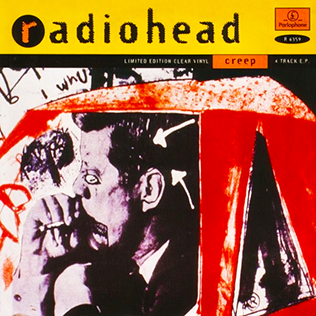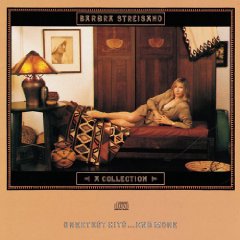
"Un-Break My Heart" is a song by American singer Toni Braxton for her second studio album, Secrets (1996). The song was written by Diane Warren and produced by David Foster. It was released as the second single from the album on October 7, 1996, through LaFace Records. The song is a ballad about a "blistering heartbreak" in which the singer begs a former lover to return and undo the pain he has caused. It won Best Female Pop Vocal Performance at the 39th Annual Grammy Awards in 1997. It has sold over 10 million copies worldwide and nearly 3 million in the United States alone, making it one of the best selling singles of all time.

"Creep" is the debut single by the English rock band Radiohead, released on 21 September 1992. It was included on Radiohead's debut album, Pablo Honey (1993). It features "blasts" of guitar noise by Jonny Greenwood and lyrics describing an obsessive unrequited attraction.

Rave Un2 the Joy Fantastic is the twenty-third studio album by American recording artist Prince, who was at the time going by the unpronounceable "Love Symbol". Released on November 9, 1999, by NPG Records and Arista Records, the album was issued shortly after the release of The Vault: Old Friends 4 Sale (1999). It includes several guest appearances, including by Gwen Stefani, Eve, and Sheryl Crow; Prince also completed a cover of Crow's 1996 single "Everyday Is a Winding Road". A pop and R&B album, it departs from the soul genre found on Prince's previous efforts.

The Vault: Old Friends 4 Sale is the twenty-second studio album by American recording artist Prince. It was released on August 24, 1999, by Warner Bros. Records. The album was submitted to Warner Bros. Records in 1996, complete with artwork at the same time as Chaos and Disorder, but released three years later, shortly before Prince's Arista album release Rave Un2 the Joy Fantastic. The album was recorded from 1985 through 1996. It was the last album to be released by Warner Bros. to fulfill his 1992 contract obligations.

"Breathe" is a song by Australian singer Kylie Minogue, from her sixth studio album, Impossible Princess (1997). It was released on 16 March 1998 as the third single from the album, and her final one for the Deconstruction Records label. "Breathe" was co-written by Minogue with Ball and Vauk and produced by Dave Ball and Ingo Vauk. Backed by synthesisers and keyboards, it is an electronica track. The lyrics revolve around contemplation and calmness. "Breathe" received mostly positive reviews from music critics, some of whom highlighted the track as an album stand-out and commended the lyrical and vocal delivery.

"Angel of Mine" is a song by British R&B girl group Eternal from their first compilation album, Greatest Hits (1997). It was written by Rhett Lawrence and Travon Potts, produced by Lawrence, and released on 29 September 1997. The song became Eternal's 12th and final top-10 hit on the UK Singles Chart, peaking at number four. "Angel of Mine" was the ensemble's final single as a three-piece, as after its release, Kéllé Bryan left the group. In June 2019, "Angel of Mine" was ranked at number 91 on the Official Charts Company's "Top 100 Girl Band Singles of the Last 25 Years".

"The Greatest Romance Ever Sold" is a song recorded by American musician Prince, under his unpronounceable stage name called the "Love Symbol". It was released as the only single from his twenty-third studio album Rave Un2 the Joy Fantastic (1999). It was issued on October 5, 1999, in several different formats, including a 12-inch single, CD single, and a maxi single. Prince solely wrote and produced it, while Mike Scott provided guitar strings for the track. Several music critics found the single reminiscent to the works on his previous studio album, Diamonds and Pearls (1991).

"Sway" is a song by New Zealand singer Bic Runga. It was released as the second single from her debut studio album, Drive (1997), in 1997. The song peaked at No. 7 in New Zealand and No. 10 in Australia, earning gold certifications in both countries. At the 32nd New Zealand Music Awards, the song won three awards: Single of the Year, Best Songwriter, and Best Engineer. In 2001, it was voted the sixth-best New Zealand song of all time by members of the Australasian Performing Right Association (APRA). A music video directed by John Taft was made for the song.

Prince was well known in the entertainment industry for having a vast body of work that remains unreleased. It has been said that his vault contains multiple unreleased albums and over 50 fully produced music videos that have never been released, along with albums and other media. The following is a list, in rough chronological order, of the most prominent of these unreleased works. Many were later released and circulated among collectors as bootlegs.

"Firestarter" is a song by British electronic dance music band the Prodigy, released on 18 March 1996 by XL Recordings as the first single from their third album, The Fat of the Land (1997). It was co-written and produced by Liam Howlett and features vocals by Keith Flint. It also was the group's first number-one single on the UK Singles Chart, staying on top for three weeks, and their first big international hit, topping the charts in the Czech Republic, Finland, Hungary, and Norway. The music video was directed by Walter Stern and filmed in the London Underground, in black-and-white. Melody Maker ranked the song number two in their list of "Singles of the Year" in 1996. 24 years later, The Guardian ranked it number eight in their list of "The 100 Greatest UK No 1 Singles".

"Landslide" is a song by the British-American rock band Fleetwood Mac, written and performed by Stevie Nicks. The song was first featured on the band's self-titled album Fleetwood Mac (1975). The original recording also appears on the compilation albums 25 Years – The Chain (1992), The Very Best of Fleetwood Mac (2002) and 50 Years – Don't Stop (2018), while a live version was released as a single 23 years later from the live reunion album The Dance (1997). "Landslide" reached No. 51 on the US Billboard Hot 100 chart and No. 10 on the Adult Contemporary chart. "Landslide" was certified gold in October 2009 for sales of over 500,000 copies in the United States. According to Nielsen Soundscan, "Landslide" sold 2,093,186 copies in the United States as of 2017.

A Collection: Greatest Hits...and More is the fourth greatest hits album recorded by American vocalist Barbra Streisand. It was released on October 3, 1989 by Columbia Records. The compilation features ten songs from Streisand's career, dating from 1975 to 1988, plus two previously unreleased songs: "We're Not Makin' Love Anymore" was released as the album's lead single on September 14, 1989, and "Someone That I Used to Love" was distributed as the second and final one in 1989. Both singles charted on several record charts internationally.

"Teardrop" is a song by English trip hop group Massive Attack. Vocals are performed by Scottish singer Elizabeth Fraser, former lead singer of Cocteau Twins, who also wrote the lyrics. It was released on 27 April 1998 by Circa and Virgin as the second single from the group's third studio album, Mezzanine (1998). A harpsichord-driven track, "Teardrop" was originally set to feature vocals from Madonna, whom Massive Attack turned down in favour of Fraser.

"I Do" is a song written and performed by American singer-songwriter Lisa Loeb. Released on October 14, 1997, as the lead single from her second album, Firecracker (1997), "I Do" peaked at number 17 on the US Billboard Hot 100, becoming Loeb's second-highest charting single after her number-one debut single, "Stay " (1994). In Canada, "I Do" gave Loeb her second number-one hit, after "Stay". This song was her last top-20 single in both countries.

"Save Tonight" is a song written and performed by Swedish rock musician Eagle-Eye Cherry, released on 7 October 1997 as the lead single from his debut album, Desireless (1997). It is the album's opening track and gained substantial radio success, reaching number three in Ireland, number five in the United States, number six in the United Kingdom, and number two in Cherry's native Sweden. "Save Tonight" was awarded the Rockbjörnen award in the "Swedish song of the year 1997" category.

Crystal Ball is a box set by American recording artist Prince. It includes Crystal Ball, the artist's twentieth studio album, which is a three-disc set of "previously bootlegged" material, together with a fourth disc, The Truth, the twenty-first studio album by Prince.

"Automatic" is a song recorded by Japanese–American singer Hikaru Utada, taken as the lead single from her debut album First Love (1999). It was released on December 9, 1998, through Toshiba-EMI in three physical formats: mini CD single, standard-size CD single and 12" vinyl. Additionally, the single included the A-side "Time Will Tell", which originally served as the B-side for these versions. The song was written and co-produced by Utada, while Akira Miyake and the singer's father Teruzane Utada served as producers. Despite recording in English under the name Cubic U, "Automatic" is Utada's first Japanese recording, and was released after she enrolled into high school in Japan.

Rave In2 the Joy Fantastic is a remix album by American recording artist Prince, under the unpronounceable "Love Symbol", as shown on the album cover. It was released on April 29, 2001 by NPG Records and contains remixes of songs found on Prince's twenty-third studio album, Rave Un2 the Joy Fantastic (1999). It was issued via mail exclusively through the NPG Music Club, an Internet subscription service; due to this circumstance, the album was not able to chart.

"A Rose Is Still a Rose" is a song recorded by American singer Aretha Franklin. It was written and produced by singer Lauryn Hill for Franklin's album of the same name (1998). The song focused on a motherly figure giving advice to a younger woman who keeps getting into bad relationships. Throughout "A Rose Is Still a Rose", Franklin advises that in spite of everything and despite the woman's "scorned roses and thorn crowns," the woman is "still a rose". Elements of the song "What I Am" by Edie Brickell and the New Bohemians were sung throughout the song by Hill herself.



















